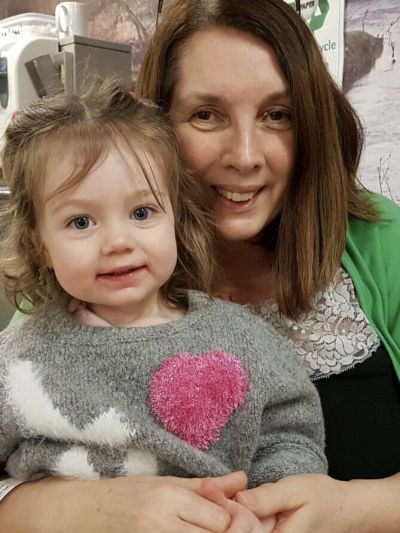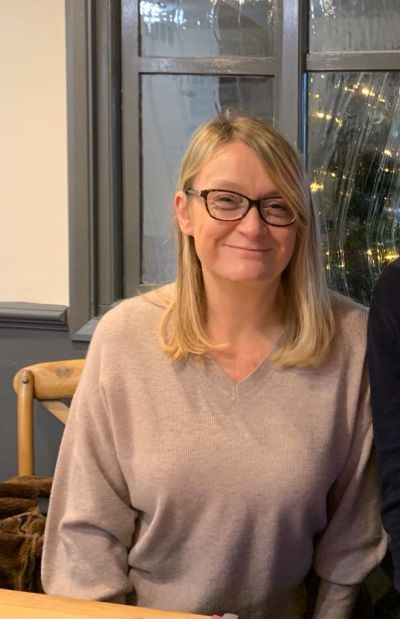
Joan Welsby’s Heart Valve Disease Story

In 2016, just months before her 60th birthday, Operating Department Practitioner at Wigan Infirmary, Joan, realised that her health was deteriorating, and she was unable to do the everyday activities that she had been. Realising something was up, she went to her GP, who heard a murmur. A subsequent echo revealed she had severe aortic stenosis, and required urgent intervention.
This is her valve disease story.
“Three months before my 60th birthday, I visited my GP, prompted by a little niggle I had. I had become unable to swim my usual 30 minutes without a rest. I worked 30 hours a week, usually three long shifts, as an Operating Department Practitioner – the person in the anaesthetic room working with the anaesthetist helping to get patients safely off to sleep, or have a regional anaesthetic for their surgery. As well as struggling with my swimming, I was finding the stairs up to the third floor of the hospital increasingly challenging.
One evening I got the lift up to theatre with colleagues for a night shift, having walked up from the car park carrying my bag of night shift ‘supplies’, when the words ‘I should be fitter than I am’ just emitted from my mouth, almost involuntarily. We all laughed, joking it was the thought of starting a night shift. Little did I know then, that it was my valve that was making me feel this way.
Thank goodness my GP listened to my heart having listened to me explaining my little ‘niggle’. She told me that she was arranging for me to have an echocardiogram, as she could hear a murmur. This revealed just two working leaflets on my aortic valve, with a subsequent diagnosis of severe aortic stenosis.
As someone who was otherwise fit and well, not on medication and with no other significant symptoms, this came as quite a shock to me. My cardiologist made it quite clear to me that I needed a replacement aortic valve within the next twelve months. An angiogram was arranged for me, to ascertain the health of my coronary arteries, which thankfully was good.
The NHS service in my area was exceptional, following a consultation with the cardiology surgeon from Wythenshawe Hospital, who is linked to our local trust, I was placed on the waiting list for my procedure, which was successfully carried out on the 9th January 2017.
There were some nerves before surgery, as there is always a danger that an emergency case can trump you at the last minute, or shortage of beds can delay admission, the latter was the case when I was admitted, but good management enabled myself and four other patients to be admitted onto the CCICU, which had empty beds, and was the post-op ward for at least two days. The pre, peri and postoperative care were well organised, and compassionately and professionally delivered.
This health scare came as a surprise to my family and friends, and so much of a relief to us all when I was back home and recovering well. I returned to work in June 2017 and was happy to record a swim of 750m in 29 mins with a 0% rest period. In retrospect, I could see how the gradual decline in the ability of my heart to provide me with the necessary amount of blood to do these swims had impaired me.
I’m retired now, a little earlier than planned due to the COVID pandemic and the high-risk nature of my job. I’m busier than ever though, childcare for my two lovely grandchildren, gardening, walking Alfie, the family Labrador, swimming, cycling and loving life with family and friends. I’m so glad my ‘niggle’ made me act, and that my GP did a stethoscope check because the rest is in place, it’s recognising the problem which is the problem.
The pandemic has impacted lots of procedures, but the NHS is still there to help us all, so we must all pay due attention to our niggles and act on them.”
Heart Valve Voice CEO, Wil Woan, said “Thank you, Joan, for sharing your story. Joan’s story is an example of something we hear a lot at Heart Valve Voice, which is when those small everyday activities become a bit harder, people often think it might be a sign of ageing, but Joan was right to think otherwise and go to her GP. That simple stethoscope check has enabled Joan to get back to work, back to her family (and of course her babysitting duties), and live a good quality of life, symptom-free.
I would also like to echo Joan’s comments about the NHS. As a retired NHS worker, Joan will know the challenges the NHS faces, but as she says, it is still here to help us when we need it, so if you feel breathless, dizzy or fatigued, contact your doctor and get a stethoscope check!”
Latest News
A Brief History of the Stethoscope and its Role in Detecting Heart Valve Disease
At Heart Valve Voice, we are committed to promoting early detection and timely treatment [...]
WHF urges countries to develop cardiovascular action plans and launches global petition
Geneva, 27 September 2024: The World Heart Federation (WHF) is launching a global petition urging all [...]
Wil’s Blog – Looking Back at International Heart Valve Disease Awareness Week 2024
As I reflect on last week’s International Heart Valve Disease Awareness Week, I am both [...]









